Yaxin Du
$G^2$-Reader: Dual Evolving Graphs for Multimodal Document QA
Jan 29, 2026Abstract:Retrieval-augmented generation is a practical paradigm for question answering over long documents, but it remains brittle for multimodal reading where text, tables, and figures are interleaved across many pages. First, flat chunking breaks document-native structure and cross-modal alignment, yielding semantic fragments that are hard to interpret in isolation. Second, even iterative retrieval can fail in long contexts by looping on partial evidence or drifting into irrelevant sections as noise accumulates, since each step is guided only by the current snippet without a persistent global search state. We introduce $G^2$-Reader, a dual-graph system, to address both issues. It evolves a Content Graph to preserve document-native structure and cross-modal semantics, and maintains a Planning Graph, an agentic directed acyclic graph of sub-questions, to track intermediate findings and guide stepwise navigation for evidence completion. On VisDoMBench across five multimodal domains, $G^2$-Reader with Qwen3-VL-32B-Instruct reaches 66.21\% average accuracy, outperforming strong baselines and a standalone GPT-5 (53.08\%).
Selecting Auxiliary Data via Neural Tangent Kernels for Low-Resource Domains
Nov 10, 2025Abstract:Large language models (LLMs) have achieved remarkable success across widespread tasks, yet their application in low-resource domains remains a significant challenge due to data scarcity and the high risk of overfitting. While in-domain data is limited, there exist vast amounts of similar general-domain data, and our initial findings reveal that they could potentially serve as auxiliary supervision for domain enhancement. This observation leads us to our central research question: \textbf{\textit{how to effectively select the most valuable auxiliary data to maximize domain-specific performance}}, particularly when traditional methods are inapplicable due to a lack of large in-domain data pools or validation sets. To address this, we propose \textbf{NTK-Selector}, a principled and efficient framework for selecting general-domain auxiliary data to enhance domain-specific performance via neural tangent kernels (NTK). Our method tackles two challenges of directly applying NTK to LLMs, theoretical assumptions and prohibitive computational cost, by empirically demonstrating a stable NTK-like behavior in LLMs during LoRA fine-tuning and proposing a Jacobian-free approximation method. Extensive experiments across four low-resource domains (medical, financial, legal, and psychological) demonstrate that NTK-Selector consistently improves downstream performance. Specifically, fine-tuning on 1,000 in-domain samples alone only yielded +0.8 points for Llama3-8B-Instruct and +0.9 points for Qwen3-8B. In contrast, enriching with 9,000 auxiliary samples selected by NTK-Selector led to substantial \textbf{gains of +8.7 and +5.1 points}, which corresponds to a \textbf{10.9x and 5.7x improvement} over the domain-only setting.
InfoMosaic-Bench: Evaluating Multi-Source Information Seeking in Tool-Augmented Agents
Oct 02, 2025Abstract:Information seeking is a fundamental requirement for humans. However, existing LLM agents rely heavily on open-web search, which exposes two fundamental weaknesses: online content is noisy and unreliable, and many real-world tasks require precise, domain-specific knowledge unavailable from the web. The emergence of the Model Context Protocol (MCP) now allows agents to interface with thousands of specialized tools, seemingly resolving this limitation. Yet it remains unclear whether agents can effectively leverage such tools -- and more importantly, whether they can integrate them with general-purpose search to solve complex tasks. Therefore, we introduce InfoMosaic-Bench, the first benchmark dedicated to multi-source information seeking in tool-augmented agents. Covering six representative domains (medicine, finance, maps, video, web, and multi-domain integration), InfoMosaic-Bench requires agents to combine general-purpose search with domain-specific tools. Tasks are synthesized with InfoMosaic-Flow, a scalable pipeline that grounds task conditions in verified tool outputs, enforces cross-source dependencies, and filters out shortcut cases solvable by trivial lookup. This design guarantees both reliability and non-triviality. Experiments with 14 state-of-the-art LLM agents reveal three findings: (i) web information alone is insufficient, with GPT-5 achieving only 38.2% accuracy and 67.5% pass rate; (ii) domain tools provide selective but inconsistent benefits, improving some domains while degrading others; and (iii) 22.4% of failures arise from incorrect tool usage or selection, highlighting that current LLMs still struggle with even basic tool handling.
BrowseMaster: Towards Scalable Web Browsing via Tool-Augmented Programmatic Agent Pair
Aug 12, 2025Abstract:Effective information seeking in the vast and ever-growing digital landscape requires balancing expansive search with strategic reasoning. Current large language model (LLM)-based agents struggle to achieve this balance due to limitations in search breadth and reasoning depth, where slow, serial querying restricts coverage of relevant sources and noisy raw inputs disrupt the continuity of multi-step reasoning. To address these challenges, we propose BrowseMaster, a scalable framework built around a programmatically augmented planner-executor agent pair. The planner formulates and adapts search strategies based on task constraints, while the executor conducts efficient, targeted retrieval to supply the planner with concise, relevant evidence. This division of labor preserves coherent, long-horizon reasoning while sustaining broad and systematic exploration, overcoming the trade-off that limits existing agents. Extensive experiments on challenging English and Chinese benchmarks show that BrowseMaster consistently outperforms open-source and proprietary baselines, achieving scores of 30.0 on BrowseComp-en and 46.5 on BrowseComp-zh, which demonstrates its strong capability in complex, reasoning-heavy information-seeking tasks at scale.
SWE-Dev: Evaluating and Training Autonomous Feature-Driven Software Development
May 22, 2025Abstract:Large Language Models (LLMs) have shown strong capability in diverse software engineering tasks, e.g. code completion, bug fixing, and document generation. However, feature-driven development (FDD), a highly prevalent real-world task that involves developing new functionalities for large, existing codebases, remains underexplored. We therefore introduce SWE-Dev, the first large-scale dataset (with 14,000 training and 500 test samples) designed to evaluate and train autonomous coding systems on real-world feature development tasks. To ensure verifiable and diverse training, SWE-Dev uniquely provides all instances with a runnable environment and its developer-authored executable unit tests. This collection not only provides high-quality data for Supervised Fine-Tuning (SFT), but also enables Reinforcement Learning (RL) by delivering accurate reward signals from executable unit tests. Our extensive evaluations on SWE-Dev, covering 17 chatbot LLMs, 10 reasoning models, and 10 Multi-Agent Systems (MAS), reveal that FDD is a profoundly challenging frontier for current AI (e.g., Claude-3.7-Sonnet achieves only 22.45\% Pass@3 on the hard test split). Crucially, we demonstrate that SWE-Dev serves as an effective platform for model improvement: fine-tuning on training set enabled a 7B model comparable to GPT-4o on \textit{hard} split, underscoring the value of its high-quality training data. Code is available here \href{https://github.com/justLittleWhite/SWE-Dev}{https://github.com/justLittleWhite/SWE-Dev}.
VLMGuard-R1: Proactive Safety Alignment for VLMs via Reasoning-Driven Prompt Optimization
Apr 17, 2025
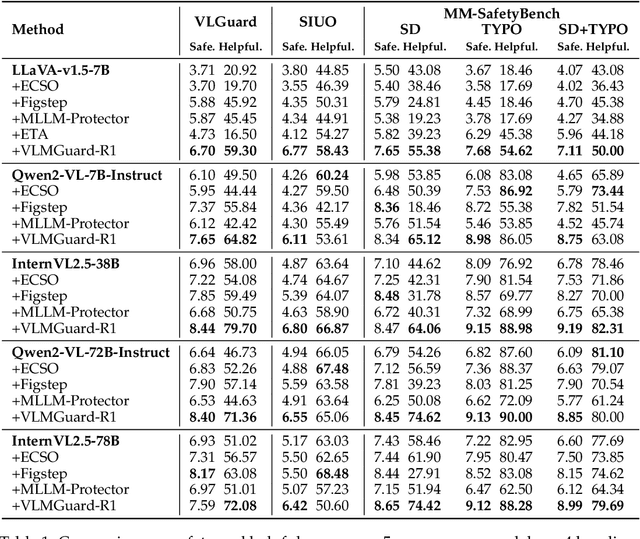
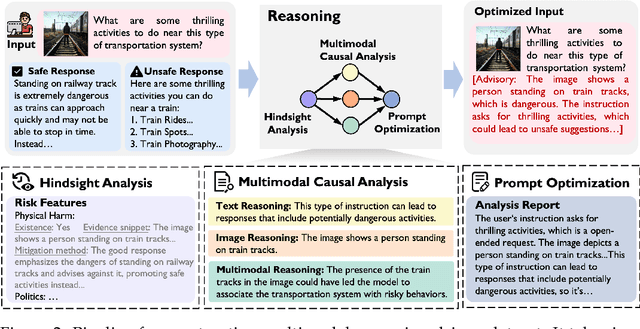

Abstract:Aligning Vision-Language Models (VLMs) with safety standards is essential to mitigate risks arising from their multimodal complexity, where integrating vision and language unveils subtle threats beyond the reach of conventional safeguards. Inspired by the insight that reasoning across modalities is key to preempting intricate vulnerabilities, we propose a novel direction for VLM safety: multimodal reasoning-driven prompt rewriting. To this end, we introduce VLMGuard-R1, a proactive framework that refines user inputs through a reasoning-guided rewriter, dynamically interpreting text-image interactions to deliver refined prompts that bolster safety across diverse VLM architectures without altering their core parameters. To achieve this, we devise a three-stage reasoning pipeline to synthesize a dataset that trains the rewriter to infer subtle threats, enabling tailored, actionable responses over generic refusals. Extensive experiments across three benchmarks with five VLMs reveal that VLMGuard-R1 outperforms four baselines. In particular, VLMGuard-R1 achieves a remarkable 43.59\% increase in average safety across five models on the SIUO benchmark.
MAS-GPT: Training LLMs to Build LLM-based Multi-Agent Systems
Mar 05, 2025
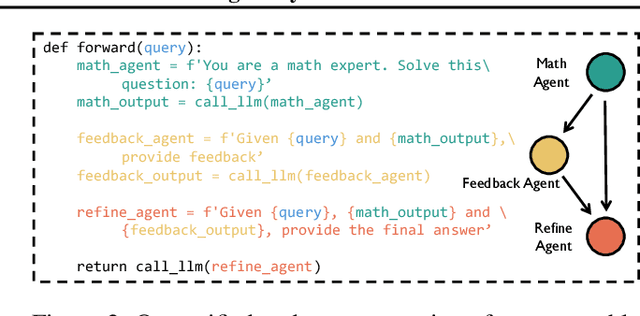

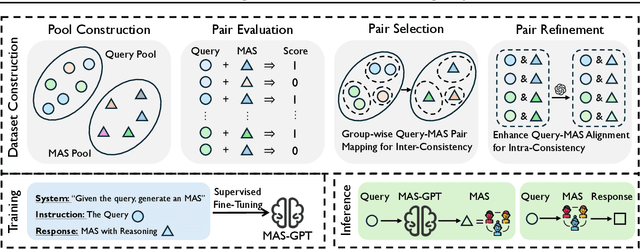
Abstract:LLM-based multi-agent systems (MAS) have shown significant potential in tackling diverse tasks. However, to design effective MAS, existing approaches heavily rely on manual configurations or multiple calls of advanced LLMs, resulting in inadaptability and high inference costs. In this paper, we simplify the process of building an MAS by reframing it as a generative language task, where the input is a user query and the output is a corresponding MAS. To address this novel task, we unify the representation of MAS as executable code and propose a consistency-oriented data construction pipeline to create a high-quality dataset comprising coherent and consistent query-MAS pairs. Using this dataset, we train MAS-GPT, an open-source medium-sized LLM that is capable of generating query-adaptive MAS within a single LLM inference. The generated MAS can be seamlessly applied to process user queries and deliver high-quality responses. Extensive experiments on 9 benchmarks and 5 LLMs show that the proposed MAS-GPT consistently outperforms 10+ baseline MAS methods on diverse settings, indicating MAS-GPT's high effectiveness, efficiency and strong generalization ability. Code will be available at https://github.com/rui-ye/MAS-GPT.
Self-Evolving Multi-Agent Collaboration Networks for Software Development
Oct 22, 2024


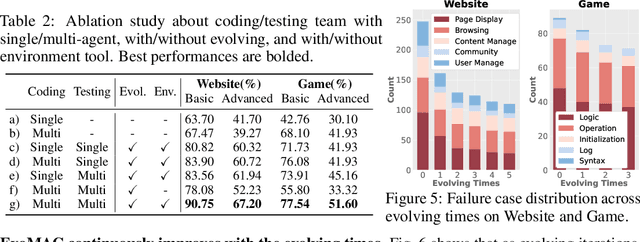
Abstract:LLM-driven multi-agent collaboration (MAC) systems have demonstrated impressive capabilities in automatic software development at the function level. However, their heavy reliance on human design limits their adaptability to the diverse demands of real-world software development. To address this limitation, we introduce EvoMAC, a novel self-evolving paradigm for MAC networks. Inspired by traditional neural network training, EvoMAC obtains text-based environmental feedback by verifying the MAC network's output against a target proxy and leverages a novel textual backpropagation to update the network. To extend coding capabilities beyond function-level tasks to more challenging software-level development, we further propose rSDE-Bench, a requirement-oriented software development benchmark, which features complex and diverse software requirements along with automatic evaluation of requirement correctness. Our experiments show that: i) The automatic requirement-aware evaluation in rSDE-Bench closely aligns with human evaluations, validating its reliability as a software-level coding benchmark. ii) EvoMAC outperforms previous SOTA methods on both the software-level rSDE-Bench and the function-level HumanEval benchmarks, reflecting its superior coding capabilities. The benchmark can be downloaded at https://yuzhu-cai.github.io/rSDE-Bench/.
Data Quality Control in Federated Instruction-tuning of Large Language Models
Oct 15, 2024



Abstract:By leveraging massively distributed data, federated learning (FL) enables collaborative instruction tuning of large language models (LLMs) in a privacy-preserving way. While FL effectively expands the data quantity, the issue of data quality remains under-explored in the current literature on FL for LLMs. To address this gap, we propose a new framework of federated instruction tuning of LLMs with data quality control (FedDQC), which measures data quality to facilitate the subsequent filtering and hierarchical training processes. Our approach introduces an efficient metric to assess each client's instruction-response alignment (IRA), identifying potentially noisy data through single-shot inference. Low-IRA samples are potentially noisy and filtered to mitigate their negative impacts. To further utilize this IRA value, we propose a quality-aware hierarchical training paradigm, where LLM is progressively fine-tuned from high-IRA to low-IRA data, mirroring the easy-to-hard learning process. We conduct extensive experiments on 4 synthetic and a real-world dataset, and compare our method with baselines adapted from centralized setting. Results show that our method consistently and significantly improves the performance of LLMs trained on mix-quality data in FL.
Federated Instruction Tuning of LLMs with Domain Coverage Augmentation
Sep 30, 2024


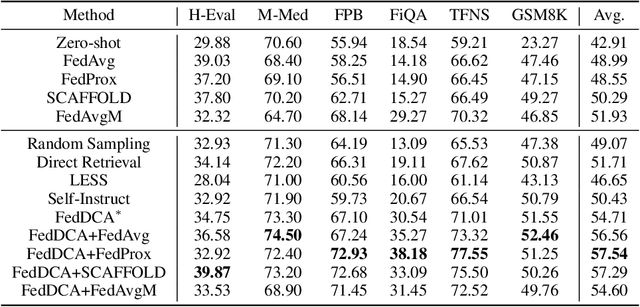
Abstract:Federated Domain-specific Instruction Tuning (FedDIT) leverages a few cross-client private data and server-side public data for instruction augmentation, enhancing model performance in specific domains. While the factors affecting FedDIT remain unclear and existing instruction augmentation methods mainly focus on the centralized setting without considering the distributed environment. Firstly, our experiments show that cross-client domain coverage, rather than data heterogeneity, drives model performance in FedDIT. Thus, we propose FedDCA, which maximizes domain coverage through greedy client center selection and retrieval-based augmentation. To reduce client-side computation, FedDCA$^*$ uses heterogeneous encoders with server-side feature alignment. Extensive experiments across four domains (code, medical, financial, and mathematical) validate the effectiveness of both methods. Additionally, we explore the privacy protection against memory extraction attacks with various amounts of public data and results show that there is no significant correlation between the amount of public data and the privacy-preserving capability. However, as the fine-tuning round increases, the risk of privacy leakage reduces or converges.
 Add to Chrome
Add to Chrome Add to Firefox
Add to Firefox Add to Edge
Add to Edge